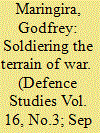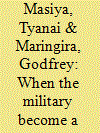|
|
|
Sort Order |
|
|
|
Items / Page
|
|
|
|
|
|
|
| Srl | Item |
| 1 |
ID:
136107


|
|
|
|
|
| Summary/Abstract |
This article examines the habitus of soldiers who either deserted or resigned from the Zimbabwe National Army in the post–2000 crisis in Zimbabwe and now live in exile in Johannesburg, South Africa. It is based on the information provided by forty-four former soldiers who related their life histories and participated in informal conversations and group discussions. A main finding is that these men, even though they have left the army, hold on in the extreme to their being as soldiers. This is shaped by at least four, interlinked dimensions of change in their lives: leaving the army without honorable discharge, leaving Zimbabwe itself, being exiles in an often unwelcoming South Africa, loss of family life and military status. The post-deployment dominance of military dispositions in the identity of the former soldiers is quite unique. Most former combatants worldwide have succeeded in different degrees to unmake their habituated forms of military identity or live with multiple identities.
|
|
|
|
|
|
|
|
|
|
|
|
|
|
|
|
| 2 |
ID:
178255


|
|
|
|
|
| Summary/Abstract |
This article argues that, through the coup, the military has become more visible in national politics in post-Mugabe Zimbabwe. The current situation under President Mnangagwa marks a qualitative difference with the military under Mugabe’s rule. Currently, in now being more prominent, the military is politics and is the determinant of any political transition that may be forthcoming in Zimbabwe. However, if it deems it necessary, the military accommodates civilian politicians into politics in order to ‘sanitize’ the political landscape in its own interests. Simultaneously, despite their involvement in the coup, ordinary soldiers feel increasingly marginalized under Mnangagwa’s government.
|
|
|
|
|
|
|
|
|
|
|
|
|
|
|
|
| 3 |
ID:
148378


|
|
|
|
|
| Summary/Abstract |
While the human rights impact of the deployment of state security agencies in the Chiadzwa diamond fields has been explored, it is important to continue to expose the increasing tendency within the sector to take public resources that should be protected by the state and used for the benefit of the people and channel them for personal gain. The security sector stranglehold of President Robert Mugabe and the ruling political party, the Zimbabwe African National Union Patriotic Front (ZANU-PF), has facilitated the siphoning of Chiadzwa diamond revenue into the pockets of individual security personnel. The unfolding sociopolitical crisis in Zimbabwe has also meant that these security personnel have been deployed beyond conflict zones and into traditionally civilian domains, with dire consequences for the public purse. With this in mind, it is asserted that these issues have driven state security agencies to enrich themselves through what is termed in this article as a ‘goat mentality’. The article thus explores the ways in which state security agencies have been deployed and gone on to promote personal enrichment in the Chiadzwa diamond fields.
|
|
|
|
|
|
|
|
|
|
|
|
|
|
|
|
| 4 |
ID:
145860


|
|
|
|
|
| Summary/Abstract |
The paper reveals how Zimbabwean soldiers who fought in the Democratic Republic of the Congo (1998–2002) were challenged by the terrain of war. While soldiers are trained to live and fight in dreadful wars, I argue that immersing oneself in the war terrain is neither mathematical nor calculative; rather, war tactics to be employed are defined by the context in which soldiers operate in. When soldiers reflect on and about the war, they unconsciously produce accounts that are often not completely heroic, but a life lived in fear as well an issue that they had never anticipated when they set out to war. A main finding of this study is that while these soldiers were deployed to fight against the rebels, they find difficulties in locating physical features from map reading to the ground, distinguishing the enemy from civilian people and deployed for days without eating a proper meal as well as seeing their fellow soldiers dying in the context of war. The paper provides a vantage point in which we can also understand that trained soldiers do not exert total power over war terrains, they are sometimes challenged by the war situation itself.
|
|
|
|
|
|
|
|
|
|
|
|
|
|
|
|
| 5 |
ID:
151754


|
|
|
|
|
| Summary/Abstract |
This paper examines the ways in which the military infringes on the social and political rights of soldiers who joined the Zimbabwe National Army in post-independence Zimbabwe. Contrary to the scholarly and policy debates that present Zimbabwean soldiers as the silent prop behind President Robert Mugabe and the perpetrators of political violence, this paper argues that these soldiers have also been victimised in army barracks. The victimhood of soldiers has been explicit in the ways in which they are forced to execute their duties beyond their professional expectations. In substantiating this argument, the paper explores the unethical military training and the ways in which soldiers are disciplined and punished through Chapter 11:02 of the draconian Defence Act. The paper’s contribution stems from a ‘rights’ perspective that emphasises the right to freedom, justice and protection, which is usually quite silent in the military. But the question is how can soldiers’ concerns be translated into new practices without compromising so-called ‘state security’?
|
|
|
|
|
|
|
|
|
|
|
|
|
|
|
|
| 6 |
ID:
144705


|
|
|
|
|
| Summary/Abstract |
In post-colonial Africa, the military has been central to sustaining freedom. However, the current political trends in Zimbabwe represent a different phenomenon, with the army perpetrating violence against its own citizens. For many years, the concept of ‘militarisation’ has been used to define social and political practices outside the military. Scholars have deployed the concept of militarisation as a category of analysis and practice. In doing so, scholarly writing portrays the military as an instrument of militarisation. So, who militarises the military? While scholars use the concept of militarisation to analyse other state institutions, the central argument of this paper is that the concept of militarisation has been deployed inappropriately and narrowly by scholars to refer to the appointment of military personnel in state institutions. I argue that in the Zimbabwean post-2000 political crisis, what has in fact been militarised is the military itself as an institution – through the command and control of soldiers against their moral will – and this phenomenon is exemplified by the growing involvement of the military in the perpetration of political violence against the civilian population in Zimbabwe. This paper draws on the experiences of 44 Zimbabwe army deserters.
|
|
|
|
|
|
|
|
|
|
|
|
|
|
|
|
| 7 |
ID:
156546


|
|
|
|
|
| Summary/Abstract |
The military poses an ongoing threat to modern democratic rule in some African countries, especially in the Zimbabwean context. This paper reveals the ways in which Zimbabwe National Army (ZNA) generals have played a political role in the Zimbabwean elections, an issue which is both a political threat and a security threat to the state. It is argued that the ways in which ZNA generals engage in the political process goes against Section 208(2) of the constitution of Zimbabwe, which summarily states that the military must be apolitical. In substantiating this argument, the paper presents and analyses various public speeches made by army generals. It is contended that the army generals’ support of the Zimbabwe African National Union – Patriotic Front (ZANU-PF) and President Robert Mugabe has to be understood as a ‘mutual accommodation’, i.e. the generals are offered privileges in return for the political protection of the ruling regime which negatively impacts the security of the vote.
|
|
|
|
|
|
|
|
|
|
|
|
|
|
|
|
|
|
|
|
|